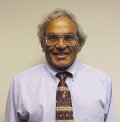|
Plenary Lecture
Modeling and Analysis of the Web-Like Networks

Professor Narsingh Deo
Nanjing Normal University
Nanjing, Jiangsu, China
E-mail: deo@cs.ucf.edu
Abstract: With the dramatic growth of the World Wide Web
(Web) and the Internet, the study of large, random networks has acquired new
prominence. Recent empirical studies have shown statistical similarities between
these two and other complex, real-life networks such as the network of phone
calls, power-distribution networks, citation network, science-collaboration
network, movie-actor collaboration network, neural networks, and various
infrastructure networks. The ubiquity and the increasing importance of such
networks have spawned a truly cross-disciplinary research aimed at understanding
their fundamental properties and functions.
Viewed as large, random graphs in which birth and death of nodes and links are
taking place continuously, these graphs differ from the classical Erdos-Renyi
random graphs in significant ways. Some of these differences have recently been
discovered through empirical studies of the real-life networks; a great deal
more remains to be discovered. In this talk we will present an overview of
recently-proposed (by us and others) dynamic random graph models of these
complex, large, real-life networks in a unified manner; explain salient
techniques (graph-theoretic, statistical, and computational) used in analyzing
these models; and discuss the main results derived through these techniques. For
instance, how the structural properties of social networks facilitate or impede
the spread of diseases, or how the properties of the Internet can be exploited
to devise efficient strategies for containing the spread of viruses and worms.
Brief Biography of the Speaker:
Professor Narsingh Deo is known for his work in computational graph theory and
in parallel algorithms. He holds the Charles N. Millican Eminent Scholar’s Chair
in Computer Science and is the Director of the Center for Parallel Computation
at University of Central Florida, Orlando. Prior to this, he was a Professor of
Computer Science at Washington State University, where he also served as the
department chair Before that he was a Professor of Electrical Engineering and
Computer Science at the Indian Institute of Technology, Kanpur, and a Member of
Technical Staff at Jet Propulsion Laboratory. He has a Ph.D. from Northwestern
University, an MS from Caltech and an undergraduate degree from Indian Institute
of Science—all in Electrical Engineering.
He has held Visiting professorships at numerous institutions--including at the
University of Illinois, Urbana; University of Nebraska, Lincoln; Indian
Institute of Science, Bangalore; and IBM's T. J. Watson Research Center, ETH,
Zurich, University of Sao Paulo, Brazil, Oak Ridge National Lab., Australian
National University, Canberra, Chuo University, Tokyo, and IIT/Kharagpur.
A Fellow of the IEEE, a Fellow of the ACM, and Fellow of the ICA, Dr. Deo has
authored four books and about 200 refereed research papers. He holds a number of
patents in computer hardware and is a recipient of NASA's Apollo Achievement
Award. Among his other awards are: Gold Medal of Patna University; Drake Scholar
at Caltech Governor's Award for Outstanding Contribution to High Tech Research
in Florida (1989); UCF's Distinguished Researcher Award-89; UCF's Professorial
Excellence Program Award (1997); UCF's Teaching Incentive Program Award (1999);
and UCF’s Excellence in Graduate Teaching Award (2001). He has served as an
editor/guest editor/ member of the editorial board for various
journals--including the IEEE Trans. on Circuits & Systems, the Journal for
Parallel and Distributed Computing; the Journal of Supercomputing, and the VLSI
Design Journal. He is currently the president of the Forum for Interdisciplinary
Mathematics.
|